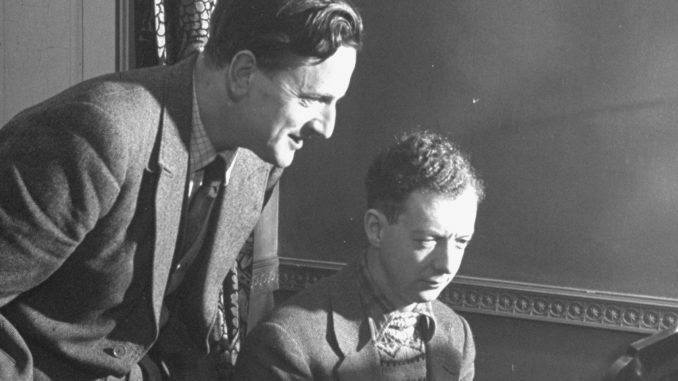
Five Chinese Lyrics (1945)
Créé par Peter Pears (ténor), le 19 juin 1949, au Jubilee Hall d’Aldebourg, accompagné au piano par Benjamin Britten.
Peter Pears & Benjamin Britten
Simon Edwards (Ténor) et Simon Lebens (Piano)
Dimanche 13 Octobre 2013 – ESPACE LEOPOLD BELLAN
Under the Pondweed
The Herd Boy’s Song
Fishing
The Pedlar of Spells
A Gentle Wind
************************************************************
Variations on an Elizabethan Theme
(also seen as Variations on Sellenger’s Round) is a set of variations for string orchestra, written collaboratively in 1952 by six English composers: Lennox Berkeley, Benjamin Britten, Arthur Oldham, Humphrey Searle, Michael Tippett and William Walton. Imogen Holst also played a role in the work, but she did not write a variation as such.
The variations were written to celebrate the forthcoming coronation of Queen Elizabeth II in June 1953. (Benjamin Britten also wrote his opera Gloriana in honour of this occasion.)
The work was structured as follows:
Theme (anon; harmonised by William Byrd; arranged for string orchestra by Imogen Holst)
Variation 1: Allegro non troppo (Arthur Oldham)
Variation 2: A Lament, Andante espressivo (Michael Tippett) The variation begins and ends with a transcription of ‘Ah Belinda!’ from Henry Purcell’s Dido and Aeneas, over which a solo violin plays a decorated version of the theme. Tippett’s variation later became well known as part of his separate piece, Divertimento on Sellinger’s Round.
Variation 3: Andante (Lennox Berkeley)
Variation 4: Quick and Gay (Benjamin Britten)
Variation 5: Nocturne, Adagio (Humphrey Searle) Britten considered this the most original of all the variations.
Variation 6: Finale, Fuga à la gigue, Presto giocoso (William Walton) Walton starts with an inversion of the theme, and concludes with the inversion combined with the original theme
The audience at the Aldeburgh Festival premiere was not told which composer wrote which variation, but were invited to participate in a guessing competition to raise funds for the festival. Nobody correctly guessed all the names
